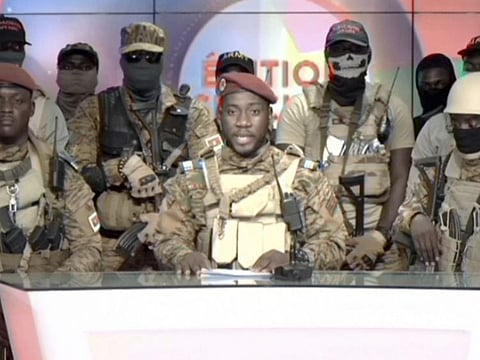Burkina Faso faces fresh uncertainty after latest coup
United States calls for return to calm and restraint by all actors

OUAGADOUGOU: Burkina Faso awoke to fresh uncertainty Saturday after its second coup this year when junior officers toppled a junta leader, saying he had failed to fight terror attacks in the deeply poor and restive West African nation.
An uneasy calm permeated through the capital Ouagadougou where soldiers in armoured vehicles and pickup trucks guarded the national television centre but traffic slowly resumed on arterial roads.
Shops slowly started reopening in the dusty and spread-out city, where pre-dawn gunfire on Friday around the presidential palace culminated in the latest coup, that drew wide condemnation.
The Economic Community of West African States regional bloc “condemned in the strongest possible terms” the latest seizure of power, calling it “inappropriate” at a time when progress was being made for a return to constitutional order by July 1, 2024.
Burkina Faso’s former colonial ruler France told its citizens in Ouagadougou, believed to number between 4,000 and 5,000, to stay home, while the European Union expressed “concern” at the unfolding events.
The United States called “for a return to calm and restraint by all actors”.
Just before 8pm (2000 GMT) on Friday, more than a dozen soldiers in fatigues appeared on the state television and radio broadcaster to announce the removal of Lieutenant-Colonel Paul-Henri Sandaogo Damiba.
They proclaimed 34-year-old Captain Ibrahim Traore in charge.
“We have decided to take our responsibilities, driven by a single ideal: the restoration of security and integrity of our territory,” they said.
“Damiba failed. Since he came to power, the zones that were peaceful were attacked. He took power but then he betrayed us,” Habibata Rouamba, a trader and activist said on Saturday.
With much of the Sahel region battling a growing Islamist insurgency, the violence has prompted a series of coups in Mali, Guinea and Chad since 2020.
In January, Damiba installed himself as leader of the country of 16 million after accusing elected president Roch Marc Christian Kabore of failing to beat back the militants.
But with more than 40 per cent of the country outside government control, the latest putsch leaders said Damiba, too, had failed.
“Far from liberating the occupied territories, the once-peaceful areas have come under terrorist control,” the new military leaders said.
They then suspended the constitution, sealed the borders, dissolved the transitional government and legislative assembly and instituted a 9:00 pm to 5:00 am curfew.
New strongman Traore was previously head of anti-jihadist special forces unit “Cobra” in the northern region of Kaya.
Damiba’s fate remains unknown.
Sign up for the Daily Briefing
Get the latest news and updates straight to your inbox



